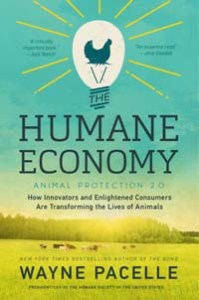Filed under: Uncategorized | Leave a comment »
New grant opportunities for killer whale conservation and alternatives to animal testing
Book Review: The Humane Economy
 The Humane Economy by Wayne Pacelle, President and CEO of the Humane Society of the United States, arrived at my door via Amazon preorder on my birthday — perfect timing considering how eagerly I anticipated its release.
The Humane Economy by Wayne Pacelle, President and CEO of the Humane Society of the United States, arrived at my door via Amazon preorder on my birthday — perfect timing considering how eagerly I anticipated its release.
As someone whose working career has revolved around philanthropy for nearly two decades, I’m both professionally and personally invested in helping to direct charitable funds towards efforts that make the world a more humane place. In the last four years, I’ve been fortunate enough to engage in the type of philanthropy that focuses on the cause nearest and dearest to my heart: animal protection.
But in analyzing how the flow of money can benefit animals, philanthropy is only part of the equation. It can be argued that consumer dollars have a far greater impact on animals — whether positive or negative — when those expenditures contribute to either supporting or counteracting the most egregious forms of cruelty in animal-based industries such as farming, hunting. medical testing, pet sourcing, wildlife management, and certain forms of entertainment, all of which Pacelle covers in depth in his latest book. Repeatedly throughout, he makes a compelling case for the idea that wherever consumer consciousness about the suffering of animals blooms, dollars inevitably follow the morally appropriate direction.
That said, what makes this book so unique and so necessary for the animal protection movement is that it does not rely solely on moral imperatives or emotional appeals for the strength of its message, but rather on extensive quantitative and qualitative data, contextual research, firsthand field experience, and clearly understandable logic. Its tone strikes a rare balance of being accessible yet eloquent, highly informative but not overly academic, and passionately committed to the cause without being preachy or self-righteous. The book does not demand that the world remake itself overnight, but instead illuminates the merits of more incremental positive shifts in behavior and attitudes that serve as cornerstones of powerful social change. It presents the goal of compassionate treatment of animals as one that is both attainable and just plain sensible.
Few books on animal protection have garnered as much visibility as this one — it’s a New York Times, Washington Post, and Los Angeles Times bestseller, and has generated numerous high-profile media appearances for Pacelle — which speaks to both the need for the approach his book embodies and the validity of his assertions regarding the evolution we are seeing in the way animals are viewed and treated by society.
Many others with far more expertise and influence than I have commented on some of the book’s finer points, so there’s not much of value that I can add to what they’ve already discussed — but I will close by saying that one of the greatest challenges that we as animal advocates face is that animal welfare is considered by many to be a “niche” interest lacking in broader social relevance and rife with excessive sentimentality. The Humane Economy dispels those notions in a way that few other single works have managed to do, and is in a strong position to win many hearts and minds that eluded us before…and for that, I am thankful.
Filed under: Uncategorized | Leave a comment »
Say you want a revolution…
Filed under: Uncategorized | Leave a comment »

